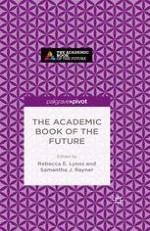Open Access 2016 | Open Access | Book

The Academic Book of the Future
Editors: Rebecca E. Lyons, Samantha J. Rayner
Publisher: Palgrave Macmillan UK
Open Access 2016 | Open Access | Book

Editors: Rebecca E. Lyons, Samantha J. Rayner
Publisher: Palgrave Macmillan UK